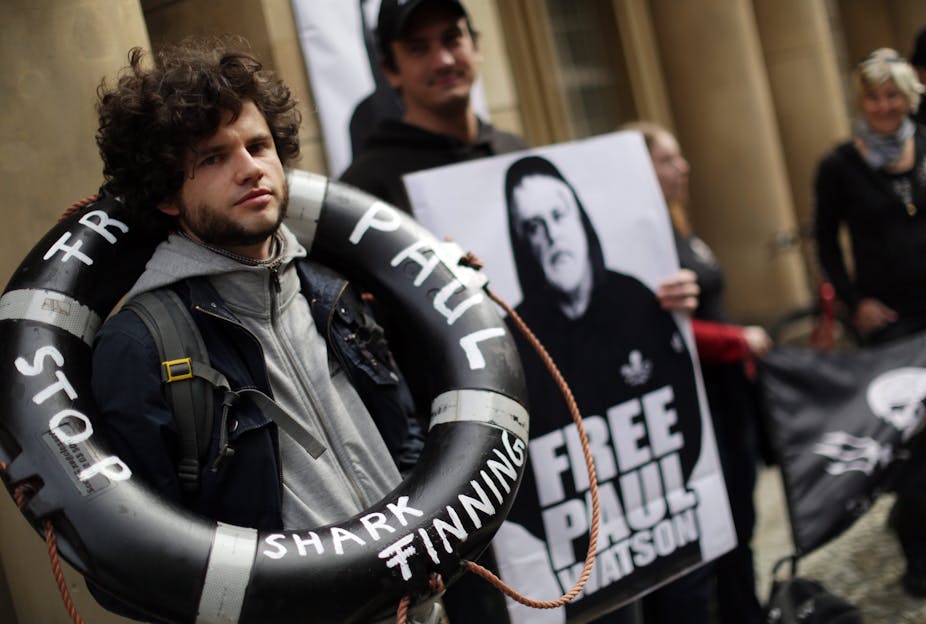Captain Paul Watson, founder of the marine conservation organisation Sea Shepherd, was arrested last week in Frankfurt, Germany, on an international arrest warrant issued by the Costa Rican government in October 2011. He was released on bail last night while Germany considers whether to extradite him.
The warrant arises from an incident that occurred in 2002, when Watson intercepted a shark finning operation in Guatemalan waters while shooting a documentary about the illegal shark fin trade. The shark finning operation in this case was being carried out by a Costa Rican vessel, the Varadero.
According to the WWF, shark finning is responsible for the deaths of up to 73 million sharks a year. It is an inhumane practice which involves catching sharks, removing their fins and then releasing the fish back to the ocean where they die.
Watson’s vessel intercepted the Varadero. They informed the port authorities in Guatemala, who subsequently instructed Watson to detain the Costa Rican crew. The Costa Rican crew, however, radioed the authorities that Watson had rammed their ship and attempted to kill them. In an intriguing twist, the Guatemalan armed naval vessel dispatched to detain the Varadero crew, turned on and detained the Sea Shepherd crew. The Costa Rican government charged Watson with seven counts of attempted murder, but all charges relating to the incident were dropped after video footage of the incident was viewed by the prosecutor.
Fast forward to October 2011. The Japanese Institute of Cetacean Research, the body under whose auspices Japan continues its annual whale hunt in the Southern Ocean, launched civil legal proceedings against Sea Shepherd in the USA. At the same time as the legal proceedings were launched, the Costa Rican government issued an arrest warrant for Watson relating to the 2002 incident on the basis of “violation of shipping traffic”.

There are numerous questions which arise from this case. Why was the arrest warrant issued now, nine years after the event and simultaneously with the Japanese legal action? Why did Germany act on the warrant? In the seven months since it was issued, Watson, a Canadian citizen, had visited numerous countries (including Australia) and none of these countries sought to detain him.
Furthermore, Interpol announced via its website that it would not be issuing a Red Notice (a request to member states for the provisional arrest, pending extradition, of wanted persons) for Captain Watson. The Interpol Office of Legal Affairs did not believe that Costa Rica’s request complied with Interpol’s constitution and rules, implying political motivation.
The Sea Shepherd 2002 documentary on shark finning, Sharkwater, alleged corruption and collusion between the Costa Rican government and the shark fin black market based in Taiwan. This may be motivation for Costa Rica to want Watson silenced. But there is no special bilateral arrangement between Germany and Costa Rica that might suggest this is a reason for Germany to move on the Costa Rican warrant where other countries did not.
Watson was arrested at Frankfurt International Airport and detained while German authorities confirmed that the Costa Rican government wanted to proceed with extradition. Having received that confirmation, Germany announced on 16 May that they would proceed with the extradition of Watson to Costa Rica where he will face legal proceedings arising from the charges. Sea Shepherd legal advisers believe that he is unlikely to receive a fair trial, given his exposure of Costa Rican government corruption relating to the shark fin trade.
The third possible player in this game of marine intrigue is Japan. Sea Shepherd is in no doubt that Japanese whaling interests are behind the arrest warrant, but this in itself is not necessarily a reason for German involvement.

One possible link is the role of Germany in developing Japan’s post-nuclear energy industry. Germany is a world leader in the development of renewable energy technology. Its renewable energy industry employs over 350,000 people and it is a cornerstone of the German economy.
The Center for Strategic and International Studies in Washington DC believes that Japan will now be “[looking] to Germany’s plan to replace it over the next decade with conservation and renewables” . More specifically, at the 20th meeting of the Japanese-German Forum in October 2011, the President of the Japanese Centre for International Public Policy Studies and a member of the German Parliament, the Bundestag, led a session entitled “Future Prospects for Germany and Japan for Responding to New Economic Challenges (like Energy Requirements)”. (This was the same month as the Institute of Cetacean Research proceeded with its civil case against Sea Shepherd in the US.)
As well as providing an example of a modern post-nuclear economy moving to renewable energy, it is likely that Germany will be providing much of the technology and expertise Japan will need for energy development.
There are further pointers to political motivation for the arrest warrant. The German prosecuting authorities stated that the Federal Minister for Justice or the Minister for Foreign Affairs could intervene to stop extradition on political grounds. Watson’s German legal counsel admitted that he had never come across this kind of statement before: “Absolutely unusual – I never had this experience in all my practice in cross border cases – the fact that the public prosecutor stated, that the German Ministry of Justice and the German Ministry of Foreign Affairs have the power to stop the extradition procedure on political reasons.”
The immediate future for Captain Paul Watson is unclear. He is being assisted by Europe Écologie members of the European Parliament, Daniel Cohn-Bendit and José Bové. Sea Shepherd has petitioned the German Minister of Justice, Sabine Leutheusser-Schnarrenberger, for his release on the basis that the arrest warrant is politically motivated.

